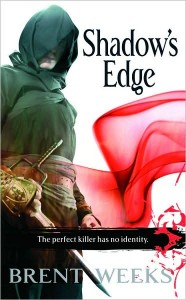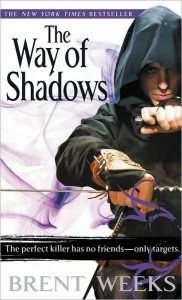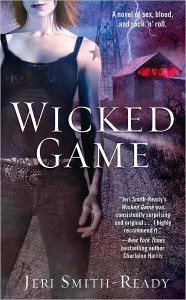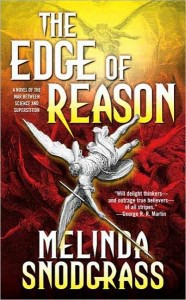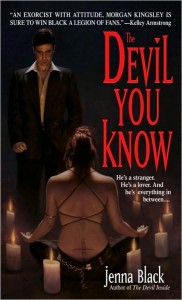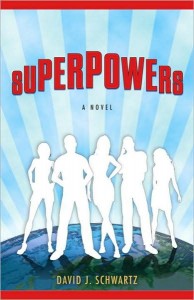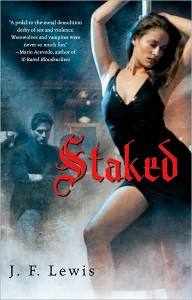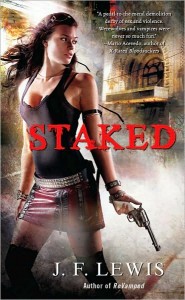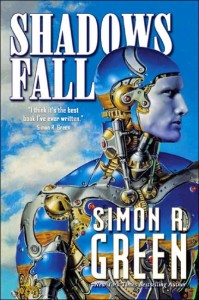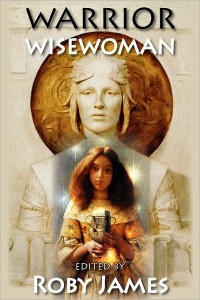 Meant in part as a science fiction companion to the long-running (and recently-resurrected) fantasy anthology series Sword and Sorceress, Warrior Wisewoman is . . . well, a complex creature, if one reads the note of explanation in the back. There, publisher Vera Nazarian says that not only is Warrior Wisewoman meant to serve as a counterpart for Sword and Sorceress, containing science fiction stories featuring strong female characters, it’s also meant to contain adult themes for a more mature audience, and present “action and adventure hinging on the sense of wonder that comes from both the scientific exploration of the universe all around us and the spiritual exploration of the other equally grand universe that lies inside.” Whew, sounds like a tall order to me. Initially, I figured that the logical science fiction companion to something like Sword and Sorceress would involve rocketships, rayguns, and bug-eyed aliens, only with strong female protagonists . . . space opera meets Ripley from Aliens, basically. Instead, it seems that editor Roby James has gone for something far different. I wanted to make that clear up front. What you’ll find here is not “classic” science fiction, and certainly not the feminine (or feminist) flipside to Heinlein, Asimov, or E.E. “Doc” Smith. It’s introspective, spiritual, experimental, and in some cases downright oblique. But does the collection work? Let’s take a closer look at some of the stories.
Meant in part as a science fiction companion to the long-running (and recently-resurrected) fantasy anthology series Sword and Sorceress, Warrior Wisewoman is . . . well, a complex creature, if one reads the note of explanation in the back. There, publisher Vera Nazarian says that not only is Warrior Wisewoman meant to serve as a counterpart for Sword and Sorceress, containing science fiction stories featuring strong female characters, it’s also meant to contain adult themes for a more mature audience, and present “action and adventure hinging on the sense of wonder that comes from both the scientific exploration of the universe all around us and the spiritual exploration of the other equally grand universe that lies inside.” Whew, sounds like a tall order to me. Initially, I figured that the logical science fiction companion to something like Sword and Sorceress would involve rocketships, rayguns, and bug-eyed aliens, only with strong female protagonists . . . space opera meets Ripley from Aliens, basically. Instead, it seems that editor Roby James has gone for something far different. I wanted to make that clear up front. What you’ll find here is not “classic” science fiction, and certainly not the feminine (or feminist) flipside to Heinlein, Asimov, or E.E. “Doc” Smith. It’s introspective, spiritual, experimental, and in some cases downright oblique. But does the collection work? Let’s take a closer look at some of the stories.
Douglas A. Van Belle turns in “Ungraceful Cliff Dwellers,” which is all about how a semi-primitive society deals with their God, a rather active and somewhat fallible being who makes frequent appearances in their lives to guide and teach them. As the protagonist continues her association with God, she learns more than any before her ever have about why her people exist, and their role in the universe. It’s an interesting story that gradually unfolds over time, but it seems to lack a little something by way of description, leaving things in a nebulous state of existence. It’s a rather cerebral story, featuring long conversations and a measure of character growth, but no action or adventure to speak of.
Rose Lemberg’s “To Find Home Again” suffers from some of that same lack of explanation, as it follows Ria, a woman who seems to be part soldier, part slave, able to fight as needed but otherwise subject to the whims and needs of her Master and his fellow crew. An ill-advised mission leads her to an unexpected detour in her career, and she’s subsequently forced to reclaim her sense of self and identity. I can’t help but wish Lemberg had opted for a little more exposition and a little less introspection, as I was never really caught up in the trials and tribulations of the main character.
Bhaskar Dutt gives us a rather strong story in “An Ashwini Apart,” which looks at the intertwined tales of Charunee and Isabella. As Ashwini, genetically-engineered pairs who can manipulate peoples’ life energy (ki) to heal or harm, they’re nothing without their opposite half — usually their own twin. Charunee and Isabella have lost their twins, but can they match up with one another to reach their potential? As the story progresses, it becomes clear that one or both may be hiding secrets. There’s a fascinating concept at play, here, and Dutt does a lovely job of showing things from two different viewpoints as he explores the mystery at the heart of the story.
In Fran LaPlaca’s “Faith,” a career soldier lands in a small community with her squadron, intent on doing some recruiting for the Navy. However, this planet has discovered an unusual sort of religion. What’s going on? The truth may be too painful to accept. An interesting story with a slow start, it builds to an emotional climax. I’d be interested in seeing more of the characters and background introduced here.
“Among The Wastes Of Time,” by Mary Catelli, is another one of the stronger offerings in this collection, though the transitions between past and present are occasionally confusing and awkward. However, we’re treated to a poignant, powerful story as one woman weighs the letter of the law versus the greater good. On the space station she calls home, an alien simply known as The Last, so-called for being the only one remaining of its species, has priority in any and all emergency situations, no matter who might suffer in its place. Does the last of a species deserve special treatment when dozens of regular people are in jeopardy? It’s up to April to make the hard call that no one else can, or will. With an intriguing setting, and a genuine moral dilemma at stake, this story is thought-provoking and complex.
The protagonist of Peg Robinson’s “As Darwin Decreed” faces a similar problem. A geneticist, she possesses the knowledge and desire to help humans adapt to an alien planet, but the rules in place prevent her from doing so, no matter who might suffer and die in the meantime. However, when a native species faces problems due to the presence of humans, it all comes down to a choice: us or them. Can she defy authority to find a third option? It’s not easy to do the right thing when the right thing is illegal. Another thought-provoking story about the hard choices we all face, it’s interesting that both this and Catelli’s story feature mothers who’ve lost their children as a result of the problem they must now solve.
“Christmas Wedding,” by Vylar Kaftan, takes place in the near future, after ecological and economic disasters have helped to plunge the world into chaos. However, life continues for some people. For Mel, Corie, and Rayvenna, nothing will stop the three women from uniting their lives in an unorthodox wedding, as a symbol of life, love, and hope. But they’ve all been hurt, mentally or physically, in the months preceding . . . can they really forge a life together? This is another one of those intellectual, emotional, spiritual stories that relies more on character than on action or adventure, and the post-apocalyptic setting is really just stage dressing for this piece on relationships and overcoming the odds.
In Sally Kuntz’ “Only A Personal Tragedy,” a young woman sacrifices everything for peace, when war comes to her home. Is she strong enough to go against her friends and family and community in order to save their lives, or will she buckle under the weight of betraying them? It may cost her more than she expects. This story’s bound to raise questions of right and wrong, treason and justice, but the science fiction setting is fairly irrelevant to the narrative as a whole.
Other authors in this collection include Catherine Mintz, Nancy Fulda, Anna Sykora, and Colleen Anderson. All in all, this is definitely a mixed bag of stories. Roby James was shooting for a blend, answering the twin questions of “What makes a woman a warrior?” and “What makes a woman wise?” and in that respect, I suppose she might have been successful. However, very few of these stories really grabbed me emotionally. Perhaps it’s just not that they appealed to my sensibilities, perhaps it’s a fundamental difference between male and female mindsets, perhaps it’s something impossible to define. Technically, this collection is competent, with a few stand-outs to really capture the attention, but overall, I fear that the theme may be just a little too esoteric, a little too specialized to find widespread appeal. I’ll be interested to see how future volumes in this series fare.
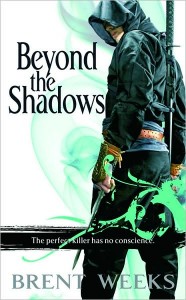 The unthinkable has happened: the Godking of Khalidor is dead, slain in combat versus the legendary wetboy, Kylar Stern and the beautiful, treacherous Vi. Now the shattered kingdom of Cenaria has to put itself together again in the aftermath of a brutal invasion. Politics and internal strife may just finish the job the Godking started, however, if Logan Gyre, rightful king, can’t find a way to rally folks around him. Meanwhile, a bizarre chain of events has installed a new Godking, a man maneuvered into place by circumstances beyond his control. But as his efforts to do the right thing backfire, and the power of the throne corrupts him, it looks as though Khalidor may still be a threat after all.
The unthinkable has happened: the Godking of Khalidor is dead, slain in combat versus the legendary wetboy, Kylar Stern and the beautiful, treacherous Vi. Now the shattered kingdom of Cenaria has to put itself together again in the aftermath of a brutal invasion. Politics and internal strife may just finish the job the Godking started, however, if Logan Gyre, rightful king, can’t find a way to rally folks around him. Meanwhile, a bizarre chain of events has installed a new Godking, a man maneuvered into place by circumstances beyond his control. But as his efforts to do the right thing backfire, and the power of the throne corrupts him, it looks as though Khalidor may still be a threat after all.
